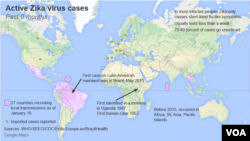The World Health Organization has declared Zika to be global public-health emergency.
At a special meeting of researchers and health officials on the virus in Geneva Monday, the WHO said Zika is "public health emergency of international concern." But it stopped short of calling for travel or trade restrictions.
The WHO predicts the virus, which may be linked to neurological disorders in babies, could infect as many as 4 million people in the Americas this year.
No firm link has been established between the Zika virus and microcephaly, a neurological disorder in which babies are born with abnormally small heads. But it is hard to ignore a possible connection between the virus and this brain disorder, given recent events in Brazil.
Nearly 4,000 suspected cases of microcephaly have been reported in the country since October, compared with 150 similar cases in 2014.
WHO spokesman Gregory Hartl told VOA experts are not ruling anything out. But, he said, the surge in the number of microephaly cases and the Zika virus may just be coincidental in terms of time and place.
"One of the curiosities is why we have so many neurological cases in, say, the northeast of Brazil, but we have not had it in other places," he said. "So, we really need to understand what is existing that causes these microcephaly cases, for example, in children."
Zika gets its name from a forest in Uganda where the virus was first identified in 1947. The virus has spread worldwide, transmitted by Aedes mosquitoes, which also causes dengue and chikungunya disease.
Hartl dismissed fears that the Zika virus could pose a threat similar to that of Ebola, which caused more than 11,000 deaths in West Africa. He noted Ebola is transmitted person to person via infected bodily fluids and kills about 50 percent of its victims.
"Zika has never killed a person and it is transmitted by the mosquito," he said. "So, we know that there are those two fundamental differences at least. Let us say that Zika on its own would not be the consideration of an emergency committee. What is the concern to the international community is the possible link with neurological disorders."
In the absence of a vaccine, Hartl said governments must stop the disease at its source by removing stagnant water where mosquitoes breed and fumigating houses to kill the mosquito.
He said pregnant women, in particular, should protect themselves by sleeping under mosquito nets, using mosquito repellents, and wearing long-sleeved shirts and pants.






